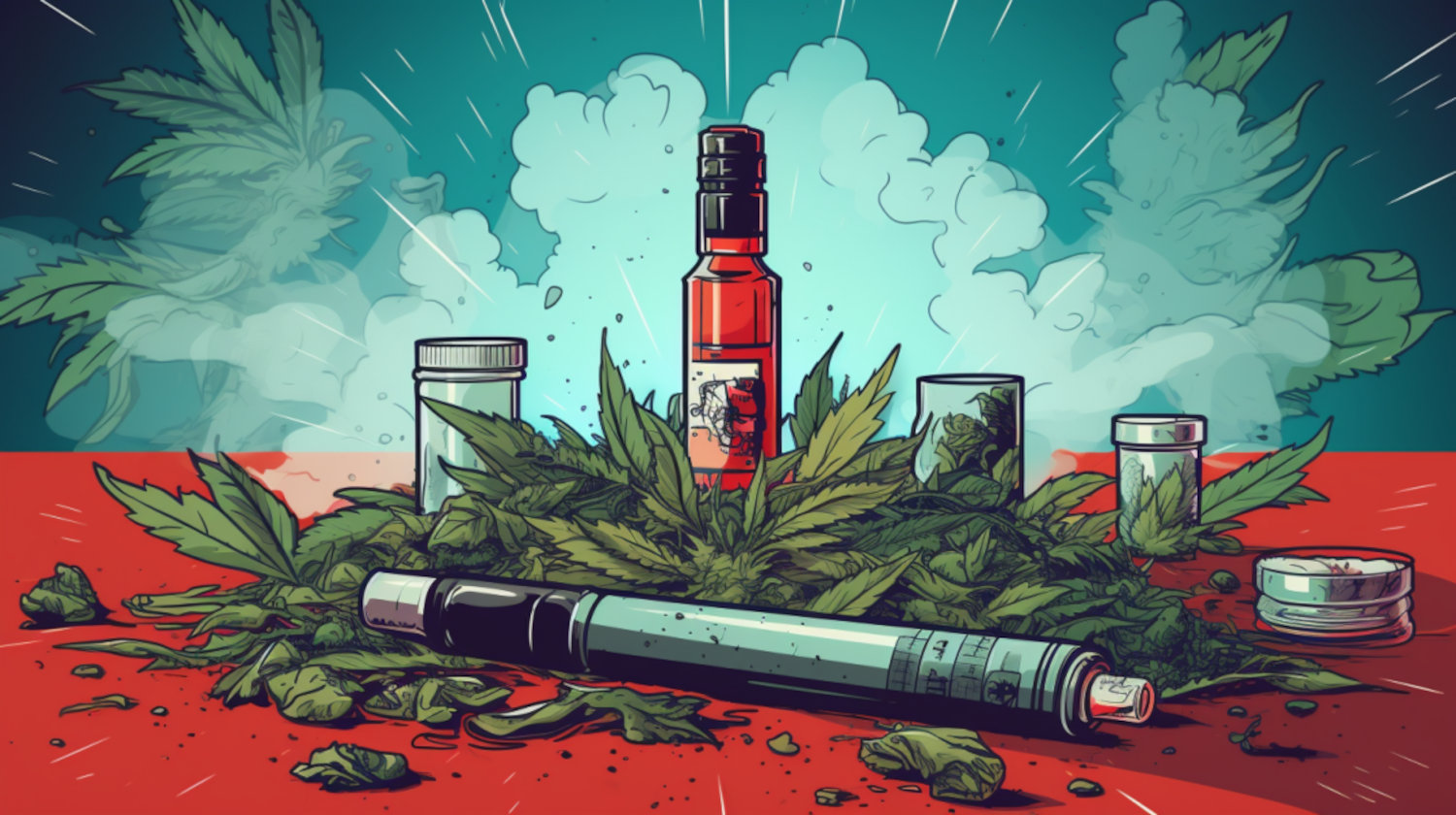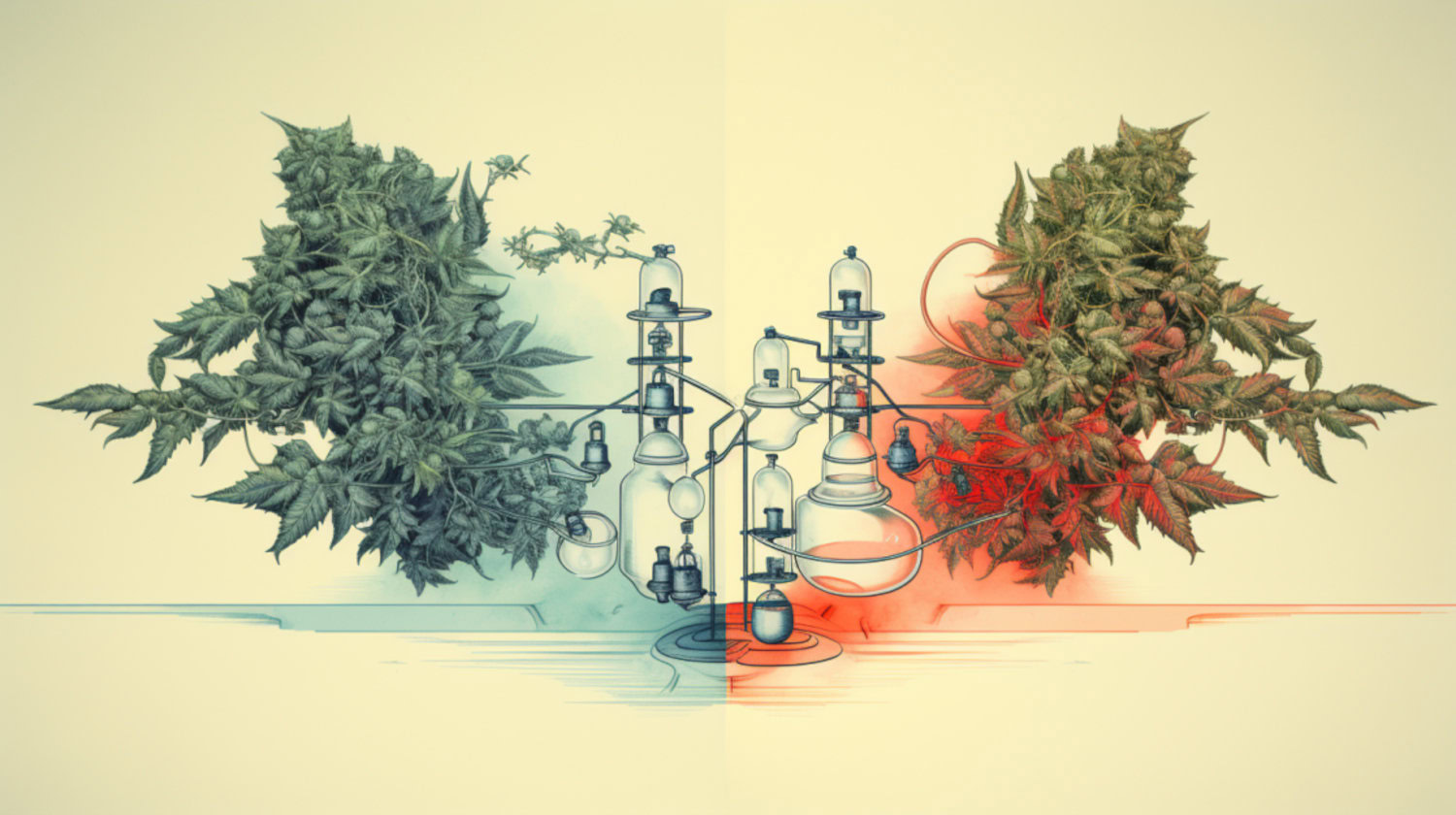The 2018 Farm Bill legalized cultivating hemp in the US. Since then, there's been interest in other cannabinoids beyond THC and CBD.
THC-O, short for tetrahydrocannabinol acetate, has entered the retail market and has been noted to have potent effects.
Unlike THC, which is derived from cannabis plants, THC-O is made in a lab using a chemical called acetic anhydride.1 Consumers who have used it say they experience similar effects compared to delta-9 THC, like euphoria, altered perception of time, and sensory perception, but more intensified. Others may feel paranoid or anxious.2
As THC-O gains popularity, consumers need to understand its effects and risks.
What is THC-O?
THC-O, often incorrectly written as THC O, THCO, THC 0, or THCO, is a newer cannabis compound getting a lot of attention for its potential effects.
Unlike naturally occurring cannabinoids, THC-O is a synthetic compound. It's created in a lab by chemically modifying CBD to develop various forms of THC (delta-9, delta-8, or delta-10) that are further converted to THC-O using acetic anhydride. This results in THC acetate derivatives (THC-O-A).1 Due to its synthetic nature, the effects of THC-O still need to be fully understood, and more research is required.
Researchers are in the early stages of understanding how THC-O affects the body and mind. Some users report more intense effects than traditional THC, like stronger euphoria, changes in how they experience time, and sharper senses.2 However, more scientific studies are needed to understand the effects of THC-O fully.
Effects and Benefits of THC-O

THC-O is psychoactive and intoxicating, meaning it can alter cognitive functions and induce euphoria. Users often report experiencing intensified intoxicating effects compared to traditional THC.
Early evidence suggests THC-O is more potent than traditional THC (delta-9-tetrahydrocannabinol).1 There's a lack of scientific studies directly comparing the two compounds, making it difficult to confirm whether THC-O consistently produces a stronger or different high.
Limited research is available regarding THC-O's specific benefits, but user reports and historical knowledge offer some clues. Some people believe THC-O might have therapeutic effects similar to THC, like pain relief, relaxation, and improved mood. However, everyone reacts differently to cannabinoids.
Military tests (1940s-1970s) indicate THC-O acetate might be twice as potent as delta-9 THC in causing coordination issues in dogs.3 While this offers a small insight into THC-O's strength, animal studies don't always translate to humans.
More scientific evidence is needed to confirm the effects of THC-O.
Risks of THC-O
Before trying THC-O, it’s important to consider the potential risks. Even with limited research on the compound, what we know about similar compounds may provide insight into THC-O and its effects.
Since THC-O acts similarly to THC in intoxicating effects, it could likely have similar or even stronger adverse effects. Side effects like trouble thinking clearly, altered perception, and impaired motor ability can all be possible.4
A report of a person without mental health problems was documented as having a panic attack after using THC-O with an e-cigarette.5
Beyond the cannabinoid itself, concerns about inconsistent testing in the cannabis industry raise additional red flags. Without stringent oversight, THC-O products may vary widely in potency, purity, and quality, increasing the risk of adverse effects and unexpected outcomes for consumers.
THC-O vs. Other Popular Cannabinoids

Looking at how THC-O compares to other familiar cannabinoids may provide insight into what to expect from it.
THC-O vs. Delta-9 THC
Delta-9-tetrahydrocannabinol (delta-9 THC) is the primary intoxicating compound in cannabis responsible for the associated "high." Both THC-O and delta-9 THC can lead to intoxicating feelings, but THC-O has been reported as being much stronger. Studies show that delta-9 THC binds to specific receptors in your brain and spine, which is why it makes you feel happy, changes how you see things, and helps you relax.6
THC-O vs. Delta-8 THC
Delta-8-tetrahydrocannabinol (delta-8 THC) is another cannabinoid found in cannabis, albeit in lower concentrations than delta-9 THC. While both THC-O and delta-8 THC are intoxicating, delta-8 THC is typically considered less potent than delta-9 THC. Studies suggest that delta-8 THC binds to CB1 receptors with less affinity than delta-9 THC, potentially resulting in milder intoxicating effects such as relaxation and mood enhancement.7
THC-O vs. Delta-10 THC
Delta-10 THC is another cannabinoid that's not as well-known as some others. It's similar to THC-O in that it is intoxicating, but it is unclear how strong it is or how it works within the body. More research is needed to understand better how delta-10 THC compares to THC-O.
THC-O vs. THCA
Tetrahydrocannabinolic acid (THCA) is the precursor to THC and is found in raw cannabis plants.8 Unlike THC-O, THCA is non-intoxicating and must undergo decarboxylation (heating) to convert into THC and produce intoxicating effects.
THCA has been studied for fighting inflammation, protecting the brain, and even fighting cancer, but more research is needed to understand how it works with cannabinoid receptors in the body.
THC-O vs. THCV
Studies show that THCV might help with inflammation, control epilepsy, and manage blood sugar levels, aiding in diabetes management.9 While more research is needed to understand THCV’s effects further, one recent study found that 20% of participants who took a 2:1 gummy with 6.5mg THCV and 3.4 mg THC felt more energized. In contrast, participants taking a 5mg THC gummy reported experiencing fatigue at a rate three times higher than the 2:1 group. The researchers also demonstrated that there was no significant increase in appetite compared to participants who took a single 5mg THC gummy, who reported a 50% increase in hunger.
THC-O Products
THC-O products like gummies and edibles have been popping up in retail spaces, but it's essential to know what to look for to ensure you’re getting safe products with consistent effects.
THC-O products come in various forms, with edibles being among the most popular choices. Gummies, in particular, have gained traction among consumers seeking an alternative to traditional THC-infused edibles. These products typically contain a measured dose of THC-O, allowing for convenient and discreet consumption.
Despite their growing popularity, THC-O products exist in a legal gray area in many regions. The unregulated nature of the hemp cannabis industry means that THC-O products may not undergo the same rigorous testing and quality control measures as legally regulated cannabis products.10
THC-O is illegal in some jurisdictions, and its sale and distribution may have legal consequences. Even in areas where THC-O products are technically legal, the lack of clear regulations leaves consumers vulnerable to purchasing substandard or potentially harmful products.
It’s essential to always buy cannabis products from trustworthy retailers who follow strict quality rules. These retailers should also provide clear information about the product's contents and any tests done.
It may also be best to learn about whether THC-O is legal where you live.
References
- Holt AK, Poklis JL, Peace MR. Δ8-THC, THC-O Acetates and CBD-di-O Acetate: Emerging Synthetic Cannabinoids Found in Commercially Sold Plant Material and Gummy Edibles. Journal of Analytical Toxicology. Published online June 8, 2022. doi:https://doi.org/10.1093/jat/bkac036
↩︎ - Kruger DJ, Amila K, Kaplan SM, et al. A Content Analysis of Social Media Discussions on THC-O-Acetate. Cannabis. 2023;6(2):13-21. Published 2023 Jul 5. doi:10.26828/cannabis/2023/000164
↩︎ - Review of Available Information on Dibezopyrans: Dimethylheptylpyran and Related Compounds. In: Possible Long-Term Health Effects of Short-Term Exposure to Chemical Agents, Volume 2. National Academies Press; 1984. doi:https://doi.org/10.17226/9136
↩︎ - Turner AR, Spurling BC, Agrawal S. Marijuana Toxicity. In: StatPearls [Internet]. StatPearls Publishing; 2023. https://www.ncbi.nlm.nih.gov/books/NBK430823/
↩︎ - Sugawara N, Yasui-Furukori N, Shimoda K. A case of panic attack developing after THC-O acetate inhalation using an e-cigarette device. Neuropsychopharmacol Rep. 2023;43(4):647-649. doi:10.1002/npr2.12345 ↩︎
- Ng T, Gupta V. Tetrahydrocannabinol (THC). In: StatPearls [Internet]. StatPearls Publishing; 2023. https://www.ncbi.nlm.nih.gov/books/NBK563174/ ↩︎
- Tagen M, Klumpers LE. Review of delta‐8‐tetrahydrocannabinol (Δ 8 ‐THC): Comparative pharmacology with Δ 9 ‐THC. British Journal of Pharmacology. 2022;179(15). doi:https://doi.org/10.1111/bph.15865
↩︎ - Moreno-Sanz G. Can You Pass the Acid Test? Critical Review and Novel Therapeutic Perspectives of Δ9-Tetrahydrocannabinolic Acid A. Cannabis and Cannabinoid Research. 2016;1(1):124-130. doi:https://doi.org/10.1089/can.2016.0008
↩︎ - Walsh KB, McKinney AE, Holmes AE. Minor Cannabinoids: Biosynthesis, Molecular Pharmacology and Potential Therapeutic Uses. Frontiers in Pharmacology. 2021;12. doi:https://doi.org/10.3389/fphar.2021.777804
↩︎ - Johnson L, Malone M, Paulson E, et al. Potency and safety analysis of hemp delta-9 products: the hemp vs. cannabis demarcation problem. Journal of Cannabis Research. 2023;5(1). doi:https://doi.org/10.1186/s42238-023-00197-6
↩︎
The information in this article and any included images or charts are for educational purposes only. This information is neither a substitute for, nor does it replace, professional legal advice or medical advice, diagnosis, or treatment. If you have any concerns or questions about laws, regulations, or your health, you should always consult with an attorney, physician or other licensed professional.




